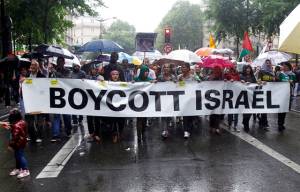
An anti-Israel march. (AP/Remy de la Mauviniere)
A business and trade organization representing Israeli entrepreneurs decided to fight boycotts against the Jewish state by establishing a network to address the growing phenomenon.
The Presidium of Israel Business Organizations (PIBS) announced Sunday the launch of a hotline for reports and complaints by Israeli entrepreneurs who have been targeted by boycotts or who are concerned about the issue due to the global anti-Israel activity of the Boycott, Divestment and Sanctions (BDS) movement.
Dan Catarivas, director of the Division of Foreign Trade and International Relations at the Manufacturers’ Association of Israel, told Globes that “the new line will enable us to provide individual and discreet solutions for Israeli businesses exposed to boycotts and attempted boycotts.”
He said they hope to provide specific solutions for varying threats depending on their location and nature.
In a letter authored by Shraga Brosh, chairman of the Presidium of Israel Business Organizations, which includes the hotel, agricultural, cinema and industrial sectors, as well as other economic concerns, he wrote: “For a long time, we have been exposed through the media, and some of us personally, to growing harassment by BDS activists promoting an economic, academic, and cultural boycott of Israel. Unfortunately, these attempts at a boycott have worsened and expanded recently, and are not expected to go away in the near future.”
Brosh said the new hotline will offer assistance from lawyers and economic consultants specializing in international trade to businessmen coping with cases of boycotts, including attempts at a “silent boycott,” in which businesses and organizations around the world refrain from doing business with Israeli companies out of concern that they will suffer public relations or economic damage.
‘Things Have Gotten Out of Hand’
Until now, the Business Organizations and the Manufacturers Association have refrained from dealing with the media in countering economic boycott initiatives against Israel. Catarivas told Globes that the “media involvement in this question serves the boycott better than anything BDS, which is much smaller than people think, can do. In recent weeks, things have gotten out of hand. The matter has been put on the public agenda, and we therefore decided to provide a proper professional address for the business community that is liable to suffer from these and other initiatives relating to a boycott of products or activity. Our objective is to prevent economic relations from being poisoned with politics.”

Manufacturers Association head Shraga Brosh. (Yossi Zeliger/Flash90)
Catarivas said his division has been cooperating with the Ministries of Justice, Foreign Affairs, and the Economy. “All the tools at our disposal will be adapted to the place where a boycott of an Israeli company is being attempted,” he explained. “Sometimes a response can use the law of the country, including a petition by us to the local courts in cooperation with our embassies around the world. We have accumulated experience in such situations and others from previous cases in which BDS operatives tried to boycott Israeli companies. This problem should be addressed, not ignored, but still – in proportion.”
By: United with Israel Staff
